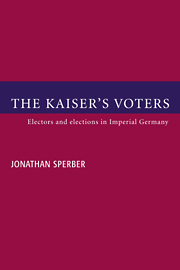4 - The Bismarckian elections
Published online by Cambridge University Press: 22 October 2009
Summary
The basic procedure used in Part 1 of this book, averaging out the results of elections over the course of a decade, has the advantage of bringing longer term trends into relief. However, it has a number of weaknesses as well, so that by itself it is inadequate for understanding the movements of voters in the general elections of Wilhelmine Germany. For one thing, averaging neglects the importance of swings in the vote from one election to the next. While in all the elections of the 1890s, for instance, the proportion of the electorate consisting of conservative voters switching to the liberals and of liberals switching to the conservatives was about equal, this was not true for each election: in 1890, there was a very sharp swing from conservatives to liberals; three years later, an even sharper swing back to the conservatives. Averaging over a decade also minimizes the significance of individual elections that stand out sharply from preceding and subsequent ones – 1878, for instance, 1907, or, above all, 1887 (a general election, I would argue, that proved to be a crucial turning point in the political history of Imperial Germany).
Consequently, in this and the following chapter, I will discuss the individual general elections. The focus will be on the specific circumstances of each election – the attitude and actions of the state authorities, the campaigns of the parties, and the issues presented to the voters, both by the parties and the government. I will compare these aspects of the elections with the results of the ecological analysis, allowing us to evaluate the effects of the campaigning on the voters.
- Type
- Chapter
- Information
- The Kaiser's VotersElectors and Elections in Imperial Germany, pp. 157 - 202Publisher: Cambridge University PressPrint publication year: 1997



